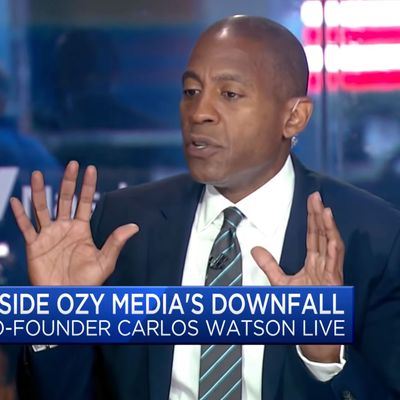
If one of Carlos Watson’s goals on Monday — when he sat for a pair of interviews on CNBC and NBC — was to head off some of the considerable legal problems that he and his company, Ozy Media, now face, it was a conspicuous failure. Immediately after Watson wrapped with CNBC, Jim Cramer said on-air that he was “stunned” by the performance, and even that may have undersold it.
The effort was the sort of perversely risky gambit that is likely to attract even more scrutiny from investors’ lawyers and, more importantly, government investigators. The standard legal advice that an executive would get in the wake of a report like the one that Ben Smith published in the Times just over a week ago — in which, among other things, a well-regarded law professor publicly opined that Ozy’s chief operating officer may have committed a crime by impersonating a YouTube executive in a diligence call with prospective investor Goldman Sachs — would be to stop talking publicly. At that point, anytime you speak in public, you are now speaking to regulators and prosecutors, too — whether you know it or not.
Watson said that he felt he needed to speak out in order to correct the public record and resurrect his company (assuming that it can be resurrected, which is far from clear). But at that point, the one and only rule — at least from the perspective of managing Watson and Ozy’s legal exposure — was to speak clearly and honestly, and to avoid any hint of obfuscation or evasion. Instead, Watson offered the appearance of contrition mixed with non sequiturs and bizarre dodges — precisely the wrong approach, and one that is likely to increase the government’s interest in what has been going on inside Ozy.
What difference did it make, for instance, that the former Ozy producer at the center of a follow-up story from Smith — in which the producer claimed that he had been misled by Ozy into believing that he was working on a show that would air on A&E — had later texted Watson enthusiastically? And why assert that a former employee who has been highly critical of the company in recent days was “fired for lying multiple times” without elaborating on this claim at all?
Watson repeatedly described the incident with Goldman with words like “sad” and “tragic” — almost as if Ozy itself had been the aggrieved party. He was confronted by NBC’s Craig Melvin with reports that Ozy had been inflating its online traffic figures and had used misleading advertising, but rather than address the claims head-on, Watson spoke about how he was “the son of teachers” and had “once worked” at NBC before complaining that he had gotten bad PR advice last week. Eventually, he acknowledged that the follow-on reporting in the wake of Smith’s first column had included “some cases, some real things that we did not well.”
Watson also conspicuously breezed past a question about whether he had been contacted by federal investigators — briskly saying that “I definitely haven’t” — which is probably true but, as he appeared to know, meaningless. It is still very early in the going.
The worst part of Watson’s performance on Monday for him and his company is that it was consistent with a pattern — the feature that is most likely to attract investigators and prosecutors — which is that, at every step of the way in this story since the Times kicked off this feeding frenzy, there are more questions than answers.
When Smith first broke news of the Goldman call from last winter, he reported that Google had alerted the FBI and that Goldman had subsequently been contacted by the bureau. By itself, the call may not have attracted much scrutiny, at least from criminal investigators, and it is possible that they dropped it or placed it on a back burner. After all, the effort at impersonation failed, and protecting Goldman Sachs is not exactly a crucial public-safety priority. The episode may have been wire fraud or securities fraud (since the apparent objective was to induce an equity investment from Goldman). But these are extremely broad categories of misconduct, and the Justice Department often chooses not to invest criminal resources in cases like this — where there was not an actual loss, where civil regulators (like the Securities and Exchange Commission) can pursue an enforcement action that might provide a sufficient punitive and deterrent outcome, and where the possible victim is a well-resourced company that is capable of fending for itself in the legal system. (As an illustration of how this might work, on Tuesday an Ozy investor filed a $2 million suit against the company for “fraudulent, deceptive and illegal conduct.”)
Watson attributed the call with Goldman to a mental-health crisis on the part of the COO, but how could it possibly have been the case that this did not (as Smith reported) prompt a broader investigation by the company’s board into whether similar incidents had occurred? Marc Lasry, a hedge-fund manager and the chairman of the board at the time, called it “an unfortunate one-time event,” but how had he reached this conclusion?
Late last week, Lasry resigned — saying that he did not have the experience that Ozy needed in “crisis management and investigations” — but that also made little sense. The boards of companies in crisis are not always stocked with these sorts of professionals, which is why they hire crisis PR firms and law firms. (A planned internal investigation by the law firm where I used to work has evidently been called off — yet another red flag.) And even if that was the rationale, why resign before a successor could be put in place?
Perhaps Lasry just wanted to quickly escape a sinking ship — it is probably not an enjoyable experience to preside over a company that appears to be in terminal decline. But even the possibility that members of the board were involved in the shenanigans at Ozy will provide further reason for investigators and perhaps criminal prosecutors to get involved.
At this point, the possibility of a serious and wide-ranging federal criminal investigation appears highly likely. Federal prosecutors are loath to admit it even in private, but many of them like to see their cases — and ideally their names — in the press, and when a potential case emerges from credible reporting in the elite press, there is often an internal scramble among offices to lay claim to it. That is true even if the law-enforcement rationale — protecting a bunch of wealthy investors who are free to hire their own investigators and file their own lawsuits — is dubious as a matter of allocating limited resources in an age of apparently unprecedented financial fraud.






























